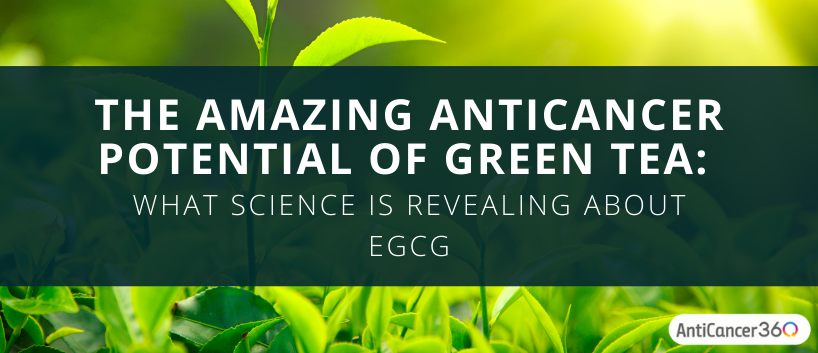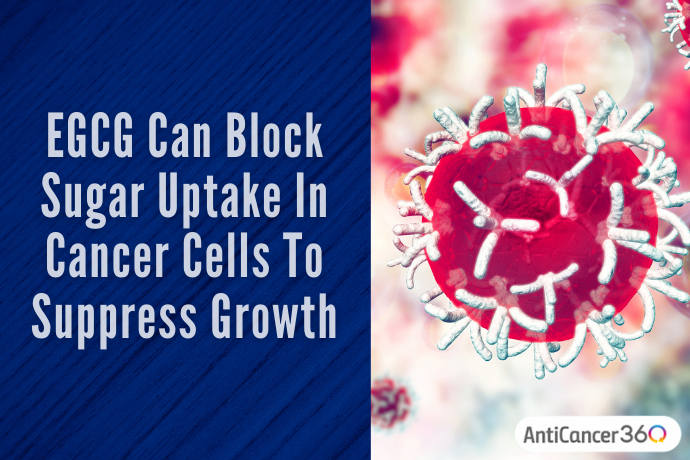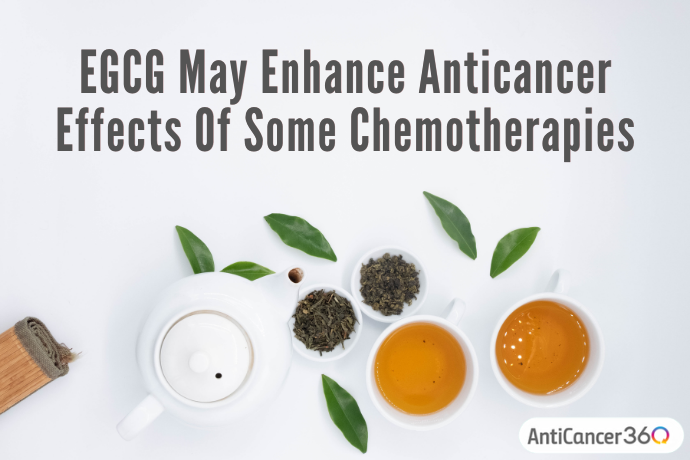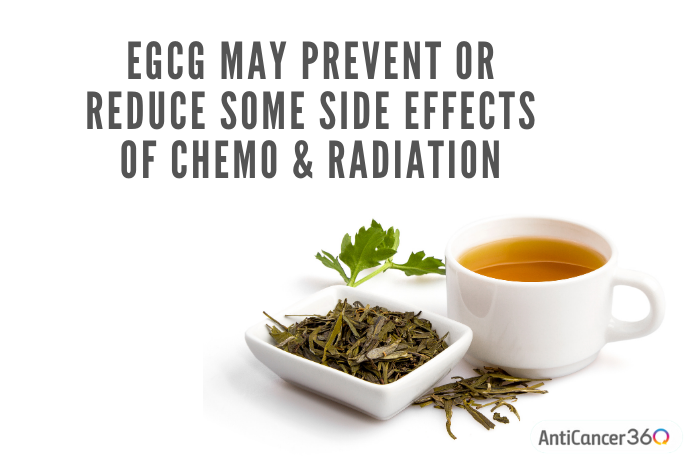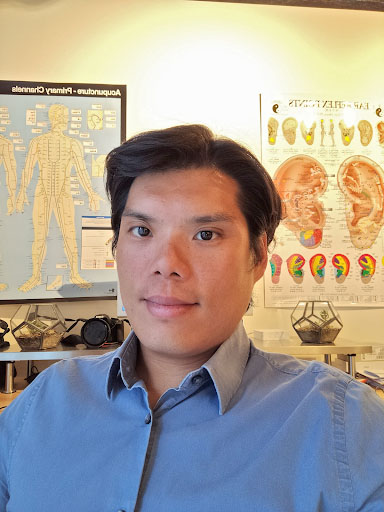When you are fighting cancer, it is essential to support your body in every way possible, in addition to following your overall treatment plan. Green tea has an abundance of well-established health benefits and may be a useful weapon for fighting cancer from every angle.
Besides water, tea is the most popular beverage in the world. Tea is intricately woven into the social, medicinal, and traditional fabric of many cultures. As we will explore in today’s post, green tea not only energizes and soothes, but has powerful healing anticancer potential.
What is EGCG?
Green tea is made from the plant Camellia sinensis. Green tea is unique from other teas because it is produced by steaming fresh leaves at high temperatures, and not fermenting them. This steaming process leaves the valuable polyphenols intact [1].
Polyphenols are chemical compounds naturally found in plants, including various catechins. The catechin responsible for many of the proposed benefits of green tea is known as epigallocatechin gallate (EGCG) [2].
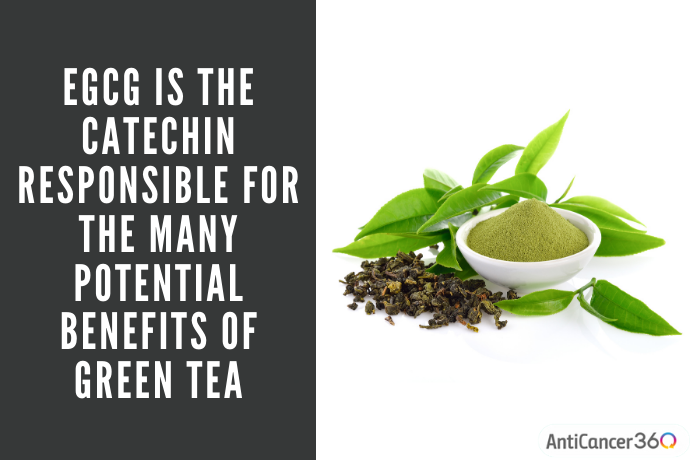
EGCG, also known as epigallocatechin 3-gallate, is the most abundant and potent green tea catechin. It has been extensively studied for its potential beneficial health effects. EGCG is known for its potential to lower the risk of heart disease, high blood pressure, high cholesterol, and Parkinson’s disease. Additionally, green tea consumption has been associated with potential weight loss, improved athletic performance, decreased risk of diabetes, and prevention of many types of cancer [3].
Many studies have shown that EGCG has potential antitumor effects on many forms of cancer. So today we are going to take a closer look at how green tea (EGCG) can help you fight cancer and how to take it.
Cancer Metabolism Suppression: How to Starve Cancer with Green Tea (EGCG)
Cancer metabolism refers to how cancer feeds itself and makes energy to grow and survive. And one critical cancer-fighting strategy involves “starving the cancer” with drugs and natural supplements.
So it makes sense to try to block sugar, fats, and proteins from “feeding” cancer cells. This strategy weakens the cancer cells and makes them more vulnerable to cancer-killing treatments.
Fortunately, many natural substances show potential in blocking cancer metabolism pathways. One of these substances is EGCG, the primary active compound in green tea.
EGCG May Suppress Cancer Metabolism of Glucose
Cancer cells demand large amounts of energy from glucose (sugar) to fuel their high metabolic drive to grow and proliferate. EGCG appears to exert an antitumor effect through the blockage of glucose metabolism. EGCG also blocks critical enzymes that participate in the glycolytic pathway [2].
Glycolysis is the first step of glucose breakdown to extract energy for cellular metabolism. EGCG decreases the activity of certain enzymes that play a critical role in regulating glycolysis, including hypoxia-inducible factor 1α (HIF1α) and glucose transporter 1 (GLUT1) [4].
EGCG appears to have a dose-dependent, paradoxical effect in terms of its blood sugar lowering and potential anticancer actions. Unlike in healthy cells, EGCG can actually block glucose uptake into cancer cells. So EGCG may help the body regulate its blood sugar levels while blocking sugar uptake into cancer cells to suppress their growth.
At low concentrations, EGCG seems to stimulate GLUT1, enhancing glucose uptake into cells. The enhancement of GLUT1 may explain the protective activity of EGCG against diabetes and neurodegenerative diseases. At higher concentrations, EGCG appears to inhibit GLUT1, which interrupts a cascade of metabolic events, including glycolysis, and could ultimately lead to cell death [5].
Antioxidant Effects of Green Tea (EGCG)
Besides the ways EGCG can interfere with cancer’s metabolism, green tea is well-known for its antioxidant actions.
Antioxidants are molecules that combat free radicals in your body. Free radicals are compounds that can cause damage to cells and DNA if their levels become too high. Oxidative stress occurs when antioxidants and free radicals are out of balance. Oxidative stress is linked to multiple illnesses, including diabetes, heart disease, and cancer.
The antioxidant activity of EGCG is evidenced through its effect on glutathione (an antioxidant made within our bodies’ cells), enzymatic activity, signal transduction pathways, and reactive oxygen species (ROS). Green tea confers strong antioxidant activity by maintaining oxidative balance.
EGCG is a natural antioxidant, and its pharmacological properties are considered to be beneficial to prevent various diseases associated with increased oxidative stress.
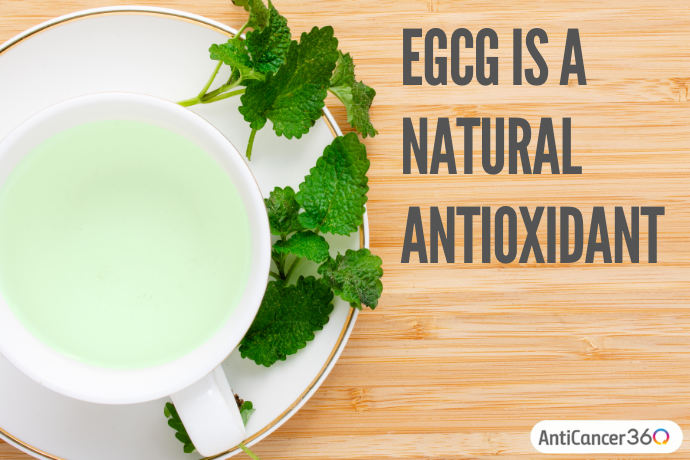
However, it has been reported that EGCG also has pro-oxidant features, mainly in cancer cells where it contributes to apoptosis (cell death) [6].
An Aggressive Integrative Approach with Green Tea (EGCG)
Over the last several decades, many laboratory and animal studies have been performed to examine the effects of EGCG on various molecular targets for potential cancer prevention and treatment. The majority of these studies showed that EGCG inhibits a vast array of cancer-related cellular processes and affects many different anticancer molecules [7].
Some researchers point out that the concentrations of EGCG attained in laboratories are higher than what can be realistically absorbed in the human body. However, combining EGCG with other natural supplements, chemotherapies, or radiation may be a potential strategy to overcome its limited absorption and improve therapy outcomes.
There are also high-absorption formulations of EGCG that can help to overcome this.
Several studies indicate that the anticancer action of chemotherapy or radiation can be possibly enhanced by combining them with other substances. Such a combination might be useful in reducing drug dosage, side effects, and resistance while simultaneously improving therapeutic outcomes. The combination of EGCG with chemotherapy or radiation can synergistically inhibit cancer cell proliferation, induce apoptosis, and prevent new blood vessel growth (angiogenesis) in tumors [8].
Some evidence suggests that green tea (EGCG) may enhance the anticancer effects of some chemotherapy drugs.
There is preliminary evidence that green tea might enhance the effects of doxorubicin (Adriamycin) on tumor cells. The caffeine, theanine, and EGCG components in green tea appear to increase the concentration of doxorubicin inside tumor cells by inhibiting the efflux enzymes that remove doxorubicin from the cells [9].
Also, lab evidence suggests that EGCG increases apoptosis induced by gemcitabine (Gemzar) [10].
Some laboratory evidence also supports the synergistic combination of EGCG with 5-fluorouracil (Adrucil), capecitabine (Xeloda), cisplatin (Platinol), docetaxel (Taxotere), and temozolomide (Temodar) [11].
In another lab study of breast cancer cells, EGCG reduced the activity of two proteins, P-glycoprotein and BCRP (breast cancer resistance protein). These proteins play a key role in the development of resistance to tamoxifen, a chemotherapy drug for breast cancer [12].
Chemotherapy resistance occurs when cancers that have been responding to therapy suddenly begin to grow. In other words, the cancer cells start to resist the effects of the chemotherapy drug. The researchers concluded from this study that EGCG has the potential to reduce resistance to tamoxifen and possibly improve outcomes for people being treated for tamoxifen-resistant breast carcinoma [13].
Green tea may help prevent or reduce the side effects of conventional cancer treatments. Specifically, EGCG can potentially relieve a major side effect of radiation therapy, known as radiation dermatitis (RDS). Symptoms of RDS include skin redness, pain, discomfort, irritation, stiffness, and itching. RDS can lead to missed radiation treatments or other downstream effects, such as the development of secondary cancers [14]. So, every possible strategy should be utilized to help reduce radiation side effects
An interesting clinical study published in 2016 demonstrated that topical (skin) applications of EGCG solution appear to be an effective treatment for radiation-induced dermatitis in breast cancer patients [8]. All patients were given EGCG solutions from the first onset of RDS until two weeks after their last radiation treatment. The EGCG solution was sprayed onto the entire radiated area of the skin three times a day. Within one week, the symptoms of pain, burning, itching, stiffness, and tenderness decreased. All 49 patients in the study tolerated the use of topical EGCG without side effects [15].
Another clinical study in 2012 found that oral administration of EGCG may have synergistic effects with radiation. In this study, breast cancer patients undergoing radiotherapy received oral EGCG 400 mg three times daily and were compared to breast cancer patients undergoing radiotherapy but with no EGCG supplementation [16].
The study found significantly better results for the patients who received EGCG. EGCG reduced the activity of NF-κB and seemed to improve cell death (apoptosis) inducing effects of radiation on breast cancer cells.
The activation of NF-κB can lead to treatment-induced tumor cell resistance. NF-κB (nuclear factor kappa light chain enhancer of activated B cells) is a family of enzymes that regulate many critical cellular processes, including inflammatory responses, cellular growth, and apoptosis. These results provided the first known evidence that EGCG potentiated radiotherapy effectiveness in breast cancer patients, and raised the possibility that this tea polyphenol has the potential to be a game-changing add-on therapy against breast cancer [17].
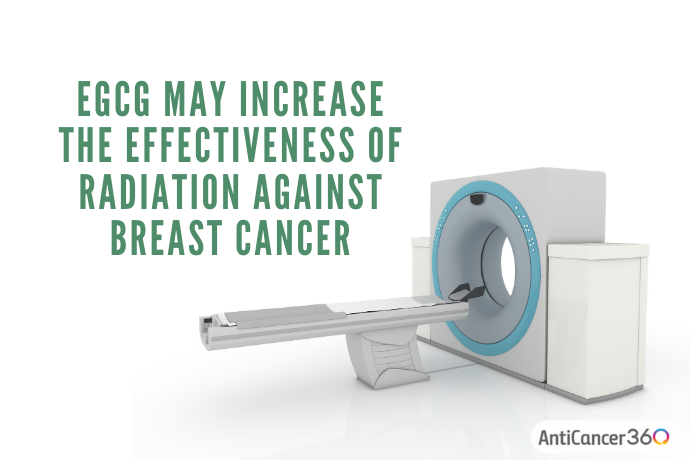
How To Use EGCG: Dosages, Side Effects, and Precautions
Dosage
Supplements containing green tea extract are standardized to contain about 400-450 mg of total catechins per capsule [18].
The usual EGCG supplement dosage ranges from 200 mg to 1500 mg per day. If taking a green tea phytosome supplement, this product may be taken on an empty stomach.
Green tea-containing beverages used in clinical research are usually standardized to contain approximately 300 mg of EGCG per cup. Green tea contains around 10-70 mg of caffeine per cup [19].
Side Effects
Green tea is generally safe and well-tolerated when consumed in moderate amounts. The most common side effects of green tea are gastrointestinal symptoms, such as stomach discomfort, nausea, or diarrhea, which may occur at higher doses [20].
Green tea extracts, in very high doses, have been potentially linked to rare but serious reports of liver damage. If you have a history of liver problems, speak to your physician before starting a green tea supplement.
Interactions with Drugs and Supplements
Green tea extracts have been possibly linked to reports of liver failure. Theoretically, taking green tea extracts with other compounds that can cause liver toxicity might have additive risks. Alcohol, acetaminophen (Tylenol), and bishop’s weed are a few examples of substances with the potential to cause liver problems [21].
Green tea contains caffeine, which is a stimulant. Consuming green tea with other stimulants or caffeine-containing products can increase the risk of heart problems or heart attacks. Avoid taking green tea with stimulants such as ephedrine, amphetamines, bitter orange, and ephedra (Ma Huang) [22].
Green tea or EGCG has the potential to influence the body’s metabolism of other supplements or medicines.
Overall, many potential drug interactions can happen with EGCG, especially with chemotherapy and other cancer-related medications. This is not an exhaustive list of all possible interactions.
You must consult with your doctor or pharmacist before adding EGCG or any new supplements to your program.
Add Green Tea (EGCG) to Cancer-Fighting Strategy
Please discuss the risk-versus-benefit potential with your healthcare professional before starting any natural supplement, including green tea or EGCG. Always share your updated medication and supplement list with your doctor or pharmacist whenever you are considering a new addition.
For most people, the many potential benefits of adding EGCG to your anticancer plan are likely to outweigh the risks.
So ultimately, when using an “Aggressive Integrative Approach” to cancer, the goal is to fight cancer from every possible direction. This approach includes integrating the use of natural supplements to fight cancer based on available evidence, despite limited human data, and to do it in a way that won’t interfere with your oncology treatments.
Are you taking a green tea supplement? Do you incorporate green tea into your daily routine? What benefits or changes have you noticed since you started taking green tea/EGCG? We would love it if our community members could share their experiences! Please feel free to comment below!
Are You A Candidate For Our Program?
If you’d like to learn more about the AntiCancer360 approach and see if we can help you… please watch our free online webinar to learn more about our approach. Then at the end, you’ll be able to schedule a free call with someone from our team so that we can discuss your case in more detail.
Citations
Dr. Patricia Weiser is one of AntiCancer360’s consultant pharmacists, science advisors, and medical writers. Her expertise helps us create safe herbal and supplement combinations and avoid potential drug interactions.
Patricia is a graduate of the University of Pittsburgh and a licensed pharmacist. She has clinical experience in both community and hospital pharmacy. She is passionate about integrative and preventative care and strives to empower her patients to take an active role in their health.

